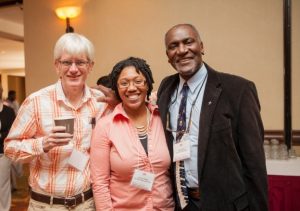
Alliance mentors Gerard Buskes, Carmen Wright, and Donald Cole at the 2012 Field of Dreams Conference in Phoenix, Arizona
The National Alliance for Doctoral Studies in the Mathematical Sciences is a model for increasing participation and inclusion of U.S. students in doctoral programs in the mathematical and statistical sciences. It is a partnership of faculty working together to mentor students who are preparing for, applying to, and entering graduate school, and subsequently graduating with a PhD.
The partnership includes faculty from primarily undergraduate institutions, many minority serving, as well as faculty from graduate programs in the math sciences. The goal of the alliance is to “be sure that every under-represented or underserved American student with the talent and the ambition has the opportunity to earn a doctoral degree in a math science.” The alliance is committed to building a community of students, faculty, and staff who will work together to transform the field of mathematical sciences.
Programmatically, the alliance offers several opportunities for undergraduate students. The offerings include the F-GAP (Facilitated Graduate Admissions Process) program, a monthly newsletter that includes undergraduate research opportunities and job postings, and the cornerstone of the alliance—the annual Field of Dreams (FoD) Conference. The FoD introduces potential graduate students to programs in the mathematical sciences at alliance schools, as well as professional opportunities in these fields. Scholars spend time with faculty mentors from the alliance schools, receive advice about their graduate school applications, and attend seminars on graduate school preparations and expectations. Additionally, faculty mentors from undergraduate programs and graduate mentors have opportunities to network.
The math alliance is led by a board of directors chaired by Philip Kutzko of the University of Iowa Department of Mathematics. He was the founding director of the alliance and has won numerous awards for mentoring and his efforts to increase diversity. The alliance has been housed at the University of Iowa since its inception, but moved to the department of mathematics at Purdue University on April 1. David Goldberg will be the executive director and take over the administrative leadership, assisted by associate director Edray Goins. Goldberg and Goins, with the rest of the Purdue team, will ensure the programmatic functions continue to help serve the alliance students and mentors.
The math alliance is hoping to bring on many more graduate program groups (GPGs)—PhD-granting departments in the math sciences that have a strong commitment to expanding the diversity in our field. Currently, there are 32 GPGs, of which four are in statistics, five are in biostatistics, one is in educational measurement, and the remaining are in math. To become a GPG, a department needs the following:
- Substantial buy-in by the senior faculty for minority doctoral education
- A strong mentoring program instituted for all graduate students
- The willingness to assess the culture and practices of the graduate program in the context of increasing numbers of U.S. and especially under-represented minority students
There will be a meeting of the statistics initiative of the math alliance during the Joint Statistical Meetings in Chicago. Look for information in the JSM program or contact Leslie McClure, initiative chair and member of the math alliance board, at lam439@drexel.edu.




Leave a Reply